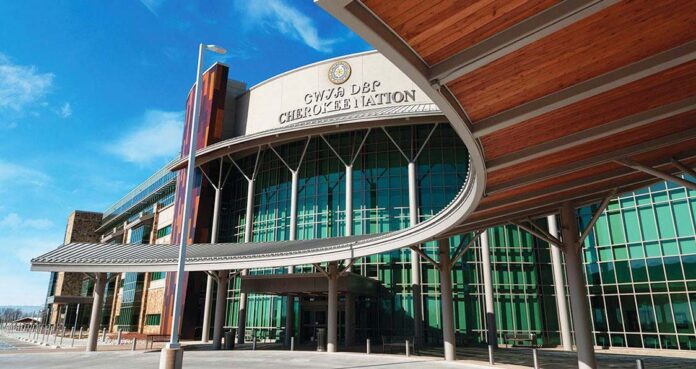TAHLEQUAH, OK – A new report is highlighting the many successes of the Cherokee Nation’s $7 million Community Partners Grants, which were distributed to nearly 270 applicants across the reservation between 2022 and 2024.
Cherokee Nation provided hundreds of thousands of dollars in grant funds to entities in each of the Cherokee Nation reservation’s 14 counties and in at-large Cherokee communities over about a two-year period, providing funds to applicants ranging from community-based non-profits to senior citizen organizations and youth league organizations, and from food banks to schools and local governments.
“The impact of our recent Community Partners Grants can be seen across our reservation, with new projects and investments that will benefit the quality of life for all who live in and visit our communities,” said Cherokee Nation Principal Chief Chuck Hoskin Jr. “These nearly 270 entities serve so many people, including thousands of Cherokee families. Their work is important to our daily lives, so I am proud to see this $7 million investment will have a generational impact.”
A few of the projects that received funding include:
- Pryor Rec Center – $55,000 for increasing access to wellness initiatives
- Tahlequah Area Coalition for the Homeless – $25,000 for operations of its day center and shower program
- Stilwell Soccer Club – $25,000 for program initiatives
- Coffeyville Area Community Foundation – $25,000 for community projects
- Town of Gore – $50,000 for public playground safety updates
- Help-in-Crisis – $50,000 for domestic violence intervention
- Tulsa Food on the Move – $25,000 for food outreach and food sovereignty efforts
- Zion Public School – $25,000 for playground safety updates
- Sallisaw Public School – $25,000 for playground safety updates
In total, more than 48% of the grant funds were provided for community investment; nearly 18% for community impact and non-profit organizations; nearly 18% for education; and nearly 16% for municipalities and rural public safety.
“From Day 1 when Chief Hoskin and I took office in 2019, we’ve made it our ongoing priority to ensure Cherokee communities are given the support they need to grow and thrive in this 21st century world,” said Cherokee Nation Deputy Chief Bryan Warner. “Sometimes it takes just one small project to completely change the quality of life and outlook for a community. I’m proud to see that these grants have helped spark new opportunities for so many of our area non-profits, community programs, schools and other entities.”
Under Chief Hoskin and Deputy Chief Warner’s efforts, and with support from the Council of the Cherokee Nation, the tribe has provided multiple grant funding opportunities since 2019.
“The Council worked with Chief Hoskin and Deputy Chief Warner on the Respond, Recover and Rebuild Plan to make generational investments in major projects such as housing, healthcare and education to name a few,” said Council Executive and Finance Chair Joshua Sam. “Community Partners represents a chance to look into many different communities and the organizations that serve them. This program was an opportunity to help pitch in with those local efforts to address community needs and invest in our shared future.”
Along with providing $7 million in Community Partners Grants from 2022 to 2024, Chief Hoskin and Deputy Chief Warner in 2023 announced a $13 million investment into the Public Safety Partners Program. The Cherokee Nation provided well over 200 area first responder agencies – sheriff’s and police departments, fire departments, EMS, emergency management services and 911 centers – with grants up to $50,000 each to support capital and equipment needs.
In 2020, during the COVID-19 pandemic, the Cherokee Nation also provided millions in grant funding opportunities through its Community and Cultural Outreach program to help Cherokee community organizations across the country serve citizens during their time of need. Funds helped Cherokee community organizations pay for operations costs and capital improvements such as modifying or expanding community buildings to improve food pantries and refrigeration capabilities. The tribe also provided Community Partners Grants to first responders and local non-profit organizations during the pandemic to help the organizations replenish their resources that had been impacted by the response efforts.

















































